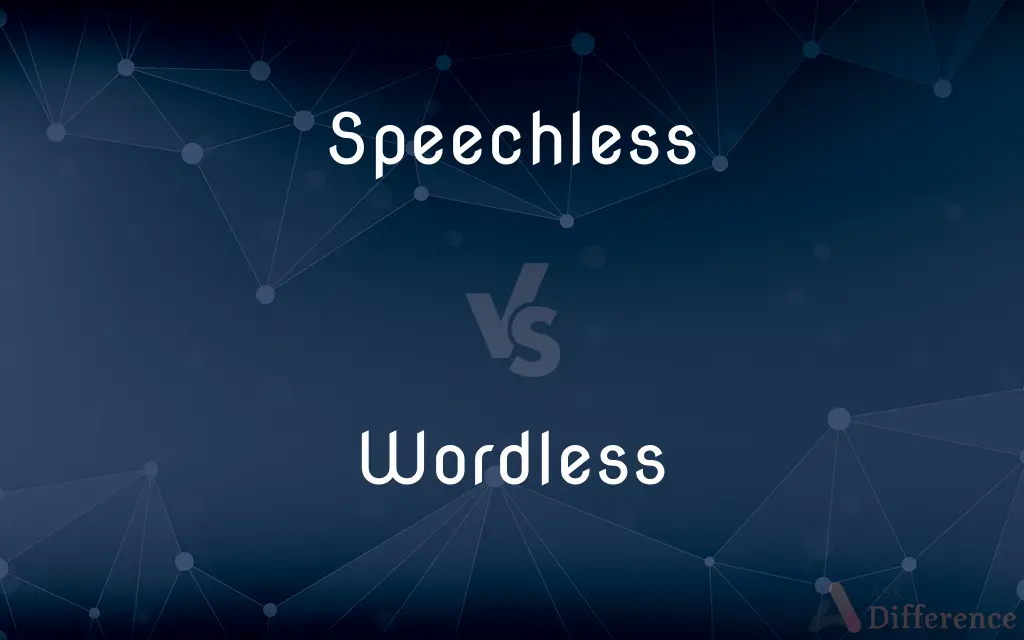Speechless vs. Wordless — What's the Difference?
By Tayyaba Rehman & Urooj Arif — Updated on April 5, 2024
Speechless implies being unable to speak, often due to shock or awe, while wordless describes a state or action without the use of words, focusing on non-verbal communication.

Difference Between Speechless and Wordless
Table of Contents
ADVERTISEMENT
Key Differences
Being speechless typically refers to a momentary loss of words, usually because of surprise, admiration, or emotional overwhelm. On the other hand, being wordless can encompass a broader range of situations where no words are spoken or necessary, including moments of silent understanding or non-verbal expressions of feeling.
Speechlessness often conveys a strong emotional response that temporarily robs someone of the ability to articulate thoughts verbally. Whereas wordlessness can be a deliberate choice or a natural state of communication, emphasizing actions, gestures, or facial expressions over spoken language.
In literature and art, a speechless character is usually depicted in a scenario that elicits a strong emotional reaction, suggesting a depth of feeling that words cannot capture. Meanwhile, wordless narratives rely on visual or other sensory details to tell a story, conveying themes and emotions without dialogue.
Socially, being speechless can indicate a profound impact made by an event or statement, affecting one's capacity to respond verbally. In contrast, choosing to remain wordless in a situation can signify a preference for reflection, the power of silence, or the effectiveness of non-verbal cues in communication.
In the context of communication, speechlessness is often temporary and specific to certain overwhelming circumstances. Wordlessness, however, can be a more sustained and versatile approach, encompassing everything from silent films to the unspoken comfort between close friends or loved ones.
ADVERTISEMENT
Comparison Chart
Definition
Incapable of speech due to shock, awe, or emotion.
Lacking or deliberately omitting spoken words.
Emotional Context
Strong emotional impact, surprise, admiration.
Can range from intentional silence to emotional expression.
Communication Method
Implies an interruption in verbal communication.
Encompasses a range of non-verbal communication forms.
Usage in Narratives
Used to highlight a character's emotional overwhelm.
Employed to emphasize action, visual storytelling.
Social Implication
Indicates a reaction to a profound or startling event.
Suggests a preference for or power of non-verbal cues.
Compare with Definitions
Speechless
Unable to speak because of intense emotion.
She was speechless with joy when she saw the surprise party.
Wordless
Emphasizing the power of silence or non-verbal cues.
In their wordless understanding, they found comfort.
Speechless
Temporarily deprived of the ability to speak, typically due to shock.
The verdict left him speechless.
Wordless
Involving actions or expressions instead of spoken words.
He gave a wordless nod of approval.
Speechless
Characterized by a lack of words in response to a situation.
After hearing the news, we were all speechless.
Wordless
Describing a deliberate choice to not use words.
They shared a wordless moment of respect.
Speechless
Experiencing or demonstrating a moment where words fail.
The breathtaking view made us speechless.
Wordless
Conveying meaning or emotion without words; non-verbal.
Their wordless exchange spoke volumes.
Speechless
Reflecting a state where verbal expression is insufficient.
Faced with her kindness, he was speechless.
Wordless
Pertaining to art or media without dialogue or narration.
The wordless comic strip was surprisingly moving.
Speechless
Unable to speak, especially as the temporary result of shock or strong emotion
He was speechless with rage
Wordless
Not expressed in words; unspoken
Wordless animosity.
Wordless joy.
Speechless
Lacking the faculty of speech.
Wordless
Inarticulate; silent
Wordless spectators.
Speechless
Temporarily unable to speak, as through astonishment.
Wordless
Conveyed without the use of words; unspoken or unsaid.
Speechless
Refraining from speech; silent.
Wordless
Unable or unwilling to speak; dumb, silent or inarticulate.
Speechless
Unexpressed or inexpressible in words
Speechless admiration.
Wordless
Not using words; not speaking; silent; speechless.
Speechless
Not speaking; not knowing what to say; silent, especially due to surprise, amazement, etc.
When he walked into his surprise birthday party, he was completely speechless.
Wordless
Expressed without speech; especially because words would be inappropriate or inadequate;
A mute appeal
A silent curse
Best grief is tongueless
The words stopped at her lips unsounded
Unspoken grief
Choking exasperation and wordless shame
Speechless
(archaic) unspeakable.
Speechless
Destitute or deprived of the faculty of speech.
Speechless
Not speaking for a time; dumb; mute; silent.
Speechless with wonder, and half dead with fear.
Speechless
Unable to speak temporarily;
Struck dumb
Speechless with shock
Common Curiosities
Can wordless communication be effective?
Yes, non-verbal cues, such as body language and facial expressions, can effectively convey messages without words.
How is wordlessness used in storytelling?
Wordless storytelling relies on visual cues, actions, and expressions to convey narrative and emotion, often used in silent films and comics.
Is being speechless a negative reaction?
Not necessarily; it can be a reaction to positive surprise, overwhelming joy, or admiration as well.
Is silence the same as wordlessness?
Silence can be a form of wordlessness, emphasizing the absence of verbal communication, but wordlessness also includes non-verbal expressions.
Can wordless interactions build relationships?
Yes, shared experiences and understandings without words can deepen connections and convey trust and intimacy.
Can a speechless moment be planned?
Speechless moments are typically spontaneous, resulting from unexpected emotional impacts, unlike wordless communication, which can be intentional.
How do people react to speechless situations?
Reactions vary from confusion and discomfort to understanding and empathy, depending on the context and relationship between the individuals.
Are there benefits to wordless communication?
It can transcend language barriers, convey subtleties of emotion, and foster a deeper level of understanding.
What are the challenges of wordless communication?
Misinterpretation and ambiguity can arise without verbal cues to clarify intent or meaning.
What causes someone to be speechless?
Intense emotions, shock, or awe can render a person temporarily unable to speak.
What is the role of context in interpreting speechlessness or wordlessness?
Context is crucial; it influences how the absence of words is perceived, whether as a sign of emotional impact or a form of expressive communication.
Can someone choose to be speechless?
While speechlessness is usually involuntary, one might choose not to speak in a moment that would typically render someone speechless.
How is speechlessness expressed in different cultures?
Cultural norms affect the expression and interpretation of speechlessness, with varying levels of openness to emotional display.
What is the significance of wordless moments in music or performance art?
Wordless moments can evoke emotion, create suspense, or provide space for audience reflection and interpretation.
How can one become better at wordless communication?
Developing empathy, observational skills, and an understanding of non-verbal cues can enhance one's ability to communicate without words.
Share Your Discovery

Previous Comparison
Plan vs. Idea
Next Comparison
Pretty vs. UglyAuthor Spotlight
Written by
Tayyaba RehmanTayyaba Rehman is a distinguished writer, currently serving as a primary contributor to askdifference.com. As a researcher in semantics and etymology, Tayyaba's passion for the complexity of languages and their distinctions has found a perfect home on the platform. Tayyaba delves into the intricacies of language, distinguishing between commonly confused words and phrases, thereby providing clarity for readers worldwide.
Co-written by
Urooj ArifUrooj is a skilled content writer at Ask Difference, known for her exceptional ability to simplify complex topics into engaging and informative content. With a passion for research and a flair for clear, concise writing, she consistently delivers articles that resonate with our diverse audience.













































